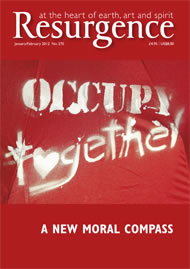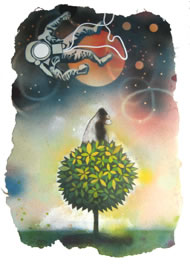The humanist project of the Western world has been based on the proposition that man is the measure of all things. It is a perspective that has increasingly separated us from our cosmic and earthly context. The late Thomas Berry pointed out long ago in The Dream of the Earth: “We are in trouble because we do not have a good story.” We are between stories, he told us; our old story is ineffective and a new one has not yet been told.
Brian Swimme and Mary Evelyn Tucker build on earlier accounts to tell that new story – a story that is grounded in science yet nourished by ancient wisdom. This is a story through which humans may find their role as deep participants in the “mind and heart of the universe”.
There is fascinating detail in both film and book, and even more, I suspect, in the accompanying educational series. Brian narrates the film, recounting the evolution of the universe from the original flaring forth – a term preferred to the ‘Big Bang’ – to the unfolding of life, sentience and consciousness on Earth.
Maybe more important is the story of this evolution as a deep patterning; and a self-organising dynamic that is immanent in the universe and reflected at every level. The universe is not just a space where things happen: it is a process of evolution. It is not based on anything like a predetermined engineering blueprint, for Nature is creative, exploratory.
And here we find new meanings for death, violence and destruction. For as it was only out of the destruction of stars that the elements of life could be formed, so, at every level, “the small self of the individual dies into and nourishes the whole community.” Destruction and violence are inextricably intertwined with the process of bringing forth more complex forms of order, including life. For the essence of life is pattern. While our bodies are composed from the matter that originated in the stars, our minds have emerged from the life-generating, self-organising patterning of the universe.
So, what of the human? We emerged, it seems, from a radical evolutionary move to greater flexibility. Human behaviour became open-ended, flexible and playful. Learning took the place of instinct. Through symbolic consciousness – language, writing, the development of civilisation – experience could be remembered and passed down, so learning served not only the individual, but also the collective.
The Earth became a resource to serve human interests, and the geological and biological structures of the Earth became ever more “permeated with human presence”. Modern culture is based on the fantasy that our role here is to “re-engineer inert matter”. We may have thought we were creating a more prosperous world, but in fact we have done the opposite. Symbolic consciousness has seized control of the evolutionary dynamics of life on Earth and deeply impoverished the planetary ecology.
But this is not inevitable. We can use our symbolic consciousness to create a benign human presence, one that will contribute to the wellbeing of the whole Earth community. We are only just beginning to understand the powers of the universe, and the hope of the new story is that through this new understanding humans can “align themselves with the grain of evolution”.
The ambition behind this film and book is enormous: to forge a new origination myth for humanity. The film has been produced in a customary documentary form, with Brian Swimme walking around the Greek Island of Samos talking to camera. It is inevitably difficult to find language and form to describe cosmic evolution, and at times I found myself distracted by the illustrative devices and metaphoric language. But maybe here also resides the strength and value of the work.
Brian Swimme, Mary Evelyn Tucker and their team have smuggled a radical, transforming message into an acceptable cultural form. The story is available in a medium (DVD) that will be acceptable in schools and colleges and readily used in community events and churches, and through this will stimulate a widening circle of conversation.
This summer I sailed across the Celtic Sea overnight in heavy weather in my little yacht Coral, and for a short while the clouds cleared and I had a sparkling view of the night sky. While the bright stars of the major constellations took my first attention, behind and beyond them I could see more and yet more stars. In the end there was no black sky between them – a web of faint starlight filled the night sky. For a few moments I experienced myself as part of the whole. How wonderful! As Brian Swimme says towards the end of the film, once we open ourselves to our place on the Earth and in the cosmos, “wonder will guide us.”
The DVD is available from www.journeyoftheuniverse.org








